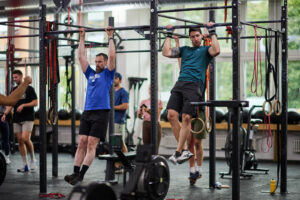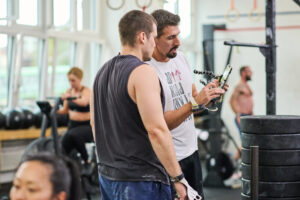
Barry’s, F45, Orangetheory and CrossFit — what actually sets these training models apart?
The group fitness world is full of strong brands—Barry’s, F45, Orangetheory, and CrossFit—all offering high-energy training in structured class formats.
At Zürich’s leading CrossFit™ coaching facility, we don’t just offer workouts—we offer a plan.
Whether you’re just getting started or returning after a break, we tailor your experience with personal coaching, clear structure, and real follow-up.
Our CrossFit-based method is proven, and our team is here to guide you—step by step.

The group fitness world is full of strong brands—Barry’s, F45, Orangetheory, and CrossFit—all offering high-energy training in structured class formats.

Most people consider themselves reasonably healthy as long as their weight is stable, their clothes fit, and day-to-day life carries
Begin with a complimentary meeting with one of our certified coaches. During this session, we’ll discuss your fitness goals, motivations, and current fitness level to understand your unique needs.
Based on your consultation, our expert coaches will create a tailored training plan just for you. This plan will align with your goals, schedule, and preferences, ensuring a structured and effective approach to achieving results.
Once your plan is ready, it’s time to dive in! Begin your CrossFit-based training with the support of best coaches in Zürich and a motivating community by your side.
With a team highly qualified and certified CrossFit coaches, we ensure professional guidance at every step of your journey.
We proudly offer coaching and support in 9 different languages, making fitness accessible and inclusive for everyone.
Let our expert coaches select the perfect training plan for you after a complimentary consultation, ensuring it aligns with your schedule, fitness level, and objectives.
Meet the skilled coaches at CrossFit Kreis 9, dedicated to helping you reach your fitness goals. Their diverse expertise and passion ensure personalized guidance welcoming environment for all levels.
“CrossFit Kreis 9 the place where I physically “die” and mentally rest.
Thank you to the coahces for teaching, supporting and motivating me! Thank you to the community for the friendship, the great chats and laughs!
I am just so glad that I made my way to CrossFit Kreis 9 a couple years ago!”
“To my incredible CrossFit coach’s and the entire team, I just wanted to express my deep appreciation and respect for all that you do. Your dedication, patience, and encouragement have not only pushed me to achieve results I never thought possible but have made every training session something to look forward to. That’s because of you that I am proud to walk shirtless at the beach.”
“Ever since I joined CrossFit Kreis 9 I got much more consistent with my training habits and also more ambitious towards achieving my training goals. I really love my routine of going to the classes here at CrossFit Kreis 9, being part of the amazing community and spending time with my friends in the gym while becoming a better version of myself.”
“Thanks to CFK9 my strength has increased noticeably. The most noteworthy change though, is the attitude on other sports and tasks. For example, when I was playing squash with friends I noticed that the ambition to fight for every points is now significantly higher. Last but not least, CrossFit has increased my confidence level not only when doing sports but also when talking to people at my job.”
Subscribe our newsletter and get all the latest CrossFit Kreis 9 news straight to your inbox!
Contact Us